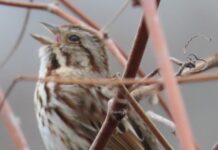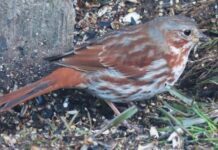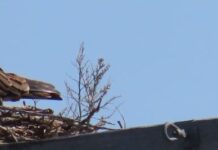Wow! Quite the change in temperatures, and how to keep warm and comfortable coping with them. Not too bad for us, but how do the birds manage to do it and still survive? Not being an expert on these facts, I am not going to dwell on them, but just give my basic knowledge an airing, so to speak. Their feathers are the main feature for heat preservation, as they can fluff them up to provide a bigger insulating air gap around their bodies, hence their bigger body shape, in some cases, when you look at them. My two pictures demonstrate some of the features that I mention here. The other way that they try to cope is by feeding more to build up their inner warmth and stamina, a very hard thing to do if their food is concealed under the snow and ice. This is where we can help in a very small way by stocking our feeders regularly, so that they have a source to go to. I am referring, of course, to only dry food and seed, not necessarily to providing water for them. They seem to cope very well with what nature has to provide them, i.e. the fresh snow.
On the subject of water and the freezing temperatures, this also gives rise to other questions, which were brought to mind following my receipt of a picture of a Bluejay from some friends of mine. They were worried that it had collided with one of their windows, but they hadn’t heard anything. They took a picture of it and noticed something strange about its beak. It appeared as if it had quite a thick coating of ice frozen on it, causing it to appear disfigured. The picture wasn’t overly clear when “blown up”, so it is awkward to really ascertain that this is so. However, on doing some more research, I found a website which has a picture of a Canada Goose with a similar looking frozen beak.
There are other examples you might find interesting to see, if you wish, by just Googling “Bird with a frozen beak”. You will find, unsurprisingly, that most of the pictures are of geese, ducks, or other waterfowl, but it obviously can happen to other types too, which might come into contact with water and then are caught by the freezing cold.
Stay safe, well and warm.
Cheers,
John Baldwin










